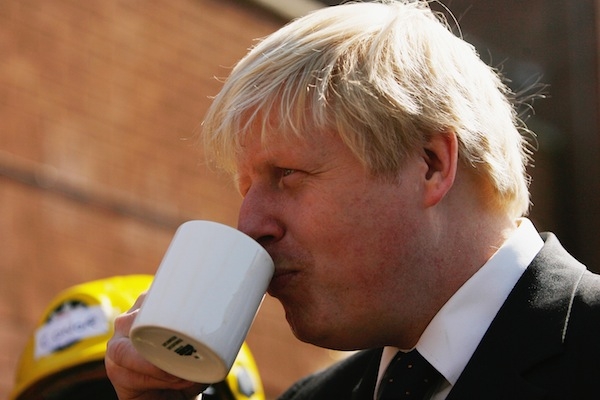Perhaps the only thing odder than the enthusiasm — found only in some small part of the Tory party — for Prime Minister Osborne is the Conservative belief in Prime Minister Boris. Where this odd faith comes from, no man can quite say. But it exists and I suppose, like other quackery, is good fun until someone gets hurt.
The London Mayor has been in New York and likes what he sees there. Mike Bloomberg, he suggests, should run for President! If nothing else this should remind you that Boris’s political judgment is, well, eccentric.
Boris, you see, is much impressed by Bloomberg’s determination to outlaw the selling and purchasing of super-sized buckets of fizzy pop. He appears to think this will make a useful contribution to reducing the so-called ‘obesity epidemic’ and that it is something London should consider too as, Lord help us, the city authorities prepare their latest anti-obesity ‘strategy’.
Fine. I dare say some people think this will have some moderately useful impact. Perhaps it will though it seems unlikely. Hark at this however:
‘For those of us who are instinctively libertarian, it is all a bit difficult – at least philosophically. But never mind the philosophy; what about the practical effects? This is the same Bloomberg, after all, whose smoking ban was also derided, and then imitated around the world. His action against smoking is now seen as a big step in reducing a particularly nasty addiction that had claimed the lives of millions. Across the West, we are seeing a falling away in the number of cancers contracted, a fall in the number of deaths. If we could reduce the consumption of sugary drinks, and release some children from the captivity of fatness, might that not be worth exploring?’
Actually, for anyone ‘instinctively libertarian’ it is not very difficult at all. Libertarians — of whatever level of instinct or conviction — are sometimes less concerned by whether a given government programme ‘works’ than they are by the question of whether or not it is an appropriate use of state power. (I concede this helps explain some of libertarianism’s electoral difficulties but that’s a different matter.)
What’s more it is telling that Boris lazily assumes that because other municipalities have copied Bloomberg’s smoking ban this is evidence said policy was a good and useful one rather than a pretty grim but telling infringement of property rights and the ability of consenting adults to organise their lives with the minimum of state-enforced interference. A bad idea does not become a good idea simply because it is widely held.
For that matter, suggesting falling rates of cancer (or heart attacks) are closely connected to smoking bans is itself a dubious and slippery argument that must ignore the truth that, in most western countries, these afflictions were becoming less rare before mayors started telling publicans they could not permit smoking in their establishments.
Boris, however, fat on power, evidently sees no restrictions on the state’s duty to intervene. This being so describing himself as ‘instinctively libertarian’ is as useful a label as describing him as ‘instinctively Maoist’ or ‘instinctively Liverpudlian’.
All this, mark you, after Boris regales us with his experience watching a baseball game as one of Bloomberg’s guests:
I dare say even Boris is alive to the irony of calling for restrictions on what the common people may enjoy while the governing class stuffs itself with free food provided, one way or another, by the common people’s taxes. But if so, he does not much remark upon the contrast between what is good for Mike’s pals and what is fine for the poor, fat, rubes in the cheap seats.
Then again, this is a matter of signaling. The wealthy are not much bothered by smoking bans or minimum pricing for alcohol. It is a different matter for the poor who find their pleasures more highly-taxed or otherwise made more expensive by politicians who will not suffer any comparable inconvenience as a result of the policies they insist are needed to make the poor behave in ways that cease to revolt their betters.
It might well be better if everyone ate better quality food and exercised more. But once a government decides it can rule on what size of cup Pepsi or Coca-Cola may be sold in it becomes clear there is almost no aspect of life into which it will not assert its right to intrude. If Boris wants to be that kind of politician then that is his right but he could at least be honest enough not to pretend to be in any way libertarian-minded.







Comments